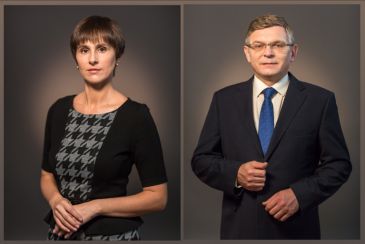Contact center of the Ukrainian Judiciary 044 207-35-46

Judges of the Criminal Cassation Court within the Supreme Court Nataliia Antoniuk and Arkadii Bushchenko participated in a discussion on assessing the needs of judges in war-related cases. The meeting, hosted by the USAID Justice for All Program on May 26, 2022, was held to develop recommendations on the content of training materials and programs of educational events to improve the skills of judges who should consider criminal proceedings following the war in Ukraine.
Experts from the USAID Justice for All Program appealed to the judges of the Supreme Court with the question of whether the judges discussed the most urgent issues related to criminal proceedings concerning the war. After all, the materials of the educational courses that are being developed should contain answers to the most common questions, so that the judges were as well prepared as possible to consider future proceedings.
Nataliia Antoniuk informed that the Criminal Cassation Court within the Supreme Court had already started discussions with the judges of the judicial chambers on the consideration of criminal cases of the courts of appeal on the specifics of the implementation of criminal proceedings under martial law. At the first meeting, among other things, they discussed crimes against the foundations of Ukraine's national security. In subsequent discussions, the topic of military and war crimes should be discussed in more detail. With regard to war crimes, according to the judge, the provisions of international criminal law should be carefully balanced against the provisions of national criminal law. The judges should be made more aware of the activities and competence of the International Criminal Court, since in the future it is possible that a number of war crimes proceedings will be heard by both the International Criminal Court and national courts. Nataliia Antoniuk is convinced that these issues need to be worked out quickly, because the first criminal proceedings are already under consideration in the courts, judges are already facing certain challenges in applying the provisions of substantive and procedural law.
The Judge of the Criminal Cassation Court within the Supreme Court believes that judges who deal with war-related criminal proceedings will be able to conduct the process well enough, but they need to be provided with guidance on more detailed knowledge of the subject and terminology specifically related to war crimes. As for the duration of the consideration of such criminal proceedings, it is difficult to say what terms are optimal - it all depends on the experience of the judge, the volume of the case file, the number of persons prosecuted, the behavior of the participants in the process, taking into account whether they impede a quick and effective consideration of the relevant proceedings.
The experts also asked what issues were more difficult for judges - qualification issues or procedural subtleties.
According to Nataliia Antoniuk, qualification issues are very important and primary for a judge. Depending on this, the judge organizes the process, ascertains the evidence base to confirm the guilt of the accused in the commission of a particular crime. Previously, Ukraine did not have much practice on the application of chap. XX of the Criminal Code of Ukraine, which deals with criminal offences against peace, security of mankind and international legal order.
Arkadii Bushchenko agreed with his colleague and focused on the fact that the issue of act qualification was in the first place. Indeed, the better the judge understands the qualification of the crime and its main elements, the more effectively he organizes his process and builds procedural behavior.
The judge said that working with war-related violations, separating a combatant’s actions from his crimes, was a complex intellectual and psychological exercise for many. Ukrainian judges have no practice in dealing with these issues. Therefore, educational courses need to provide materials on the Geneva Convention Relative to the Treatment of Prisoners of War, the definition of combatants, the basic concepts of international humanitarian law, etc.
In addition, the program experts asked the judges of the Criminal Cassation Court within the Supreme Court what tools could be provided to the judge to help correctly qualify the crime, guided by only a few lines of Art. 438 of the Criminal Code of Ukraine "Violation of the laws and customs of war", since the judicial practice under this article is very small.
Arkadii Bushchenko said that indeed, Art. 438 of the Criminal Code of Ukraine was blanket and referred to the provisions of international law, which are not generally known to judges of Ukraine. Judges of first instance, who are overloaded with cases and routine work even without military criminal offenсes, do not have much time and resources to deal with all the nuances in detail. It might be useful to make some recommendations for the judges on what questions should be answered when considering the proceedings, for example, with regard to the ill-treatment of prisoners of war. The Judge of the Criminal Cassation Court within the Supreme Court said that such guidelines existed in many countries: in some they were approved by the judiciary, while in others they were provided by authoritative organizations. He is convinced that the judges of Ukraine should have as much information as possible in order to make a clear and informed decision on the case.
Nataliia Antoniuk emphasized that Art. 438 of the Criminal Code of Ukraine required the broadest possible commentary, which would include an analysis of all the elements of the corpus delicti of the relevant crime, would contain their extended interpretation, for example, clarifying what may be “other violations of the laws and customs of war”, etc. The judge predicts that the article of the Criminal Code of Ukraine may become the most involved in national processes.